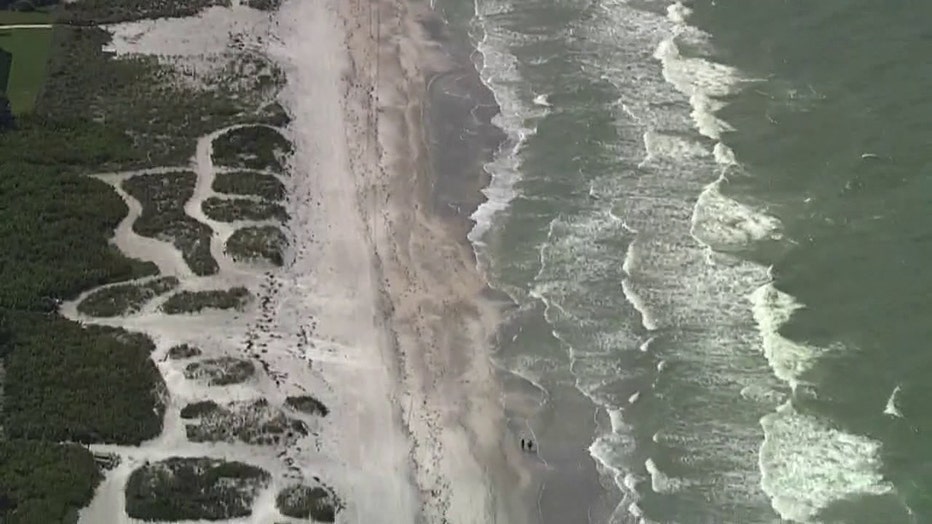Scientists find sea surface temps in South Florida estuaries are hotter than oceans around the world
Troubling sea surface temperatures in Florida
Marine scientists say sea surface temperatures in South Florida’s estuaries are hotter than anywhere else in the world, which could mean trouble for critical sea life such as coral.
TAMPA, Fla. - Florida’s marine life could use some relief from the heat as University of South Florida marine scientists are finding that sea surface temperatures in South Florida estuaries and coastal waters are hotter than oceans around the world.
As heat waves spell trouble for critical habitats like coral, some are concerned about how much more marine life can take.
With a fan in hand or a dip in the water, humans are finding ways to stay cool on land.
"It’s hot all the time. And there’s one season, and it’s summer all year round," said Rayna Laws, a Tampa resident.
But, marine life doesn’t have a way to escape the heat.
"Last year, in July, the water temp surface water temperature in Florida Bay went up to 38 centigrade. That's higher than our body temperature," said Chuanmin Hu, a professor of oceanography at USF St. Petersburg’s College of Marine Science.
Thirty-eight degrees Celsius equals 100.4 degrees Fahrenheit. The study’s findings found surface water temperatures off Southwest Florida is about two degrees Celsius warmer than the previous 20 years in response to the 2023 heat wave.
MORE: Oyster reef balls installed along Maximo Park's southern shoreline in restoration project
Sea surface temperatures are rising in Florida Bay, Tampa Bay and in South Florida’s estuaries and coastal waters. It’s the focus of a new study by USF, looking at a 20-year period. Hu explained what they found and published in the peer-reviewed scientific journals Environmental Research Letters and Estuaries and Coasts.

"Actually, to our surprise, South Florida estuaries, those are the waters between the ocean and the land, they are warming much faster than global oceans," said Hu, who went on to explain what’s causing the warming waters. "The single most important factor is air temperature. Air temperature has increased in the past two decades. And that increase is more than other places. For example, we know Texas is warm, right? It's hot. But the rate, the increase of temperature of Florida is higher than the increase of air temperature in Texas."
The warmer water temperatures put marine life under stress, making it harder to survive. Last July recorded the worst coral bleaching event in Florida. Organizations like MOTE Marine Laboratory and Aquarium are working to restore them.
"Because we have such stressful conditions out on the reef here in Florida, we really have to study what corals can survive these threats that aren’t going away," said MOTE’s Erin Muller in January while discussing the lab’s international coral gene bank.
The hotter temperatures place higher stakes on restoration efforts.
READ: Federal initiative targets plastic pollution across the country
"I think that yes, this will give a difficult time to people who want to restore seagrass, want to restore corals," said Hu.
And seagrass is a main food source for manatees. Algae also thrives in warmer waters, so Hu said more frequent hot temperatures can lead to more algal blooms, which can impact seagrass beds.
"But so far, you know, nothing really, really bad has happened yet. But that doesn't guarantee in the future we are still this lucky," Hu said.
He points out that more frequent hot sea temperatures that also last longer would be all it takes to negatively affect marine life in a more dramatic way. So, the hope now is to slow the warming down.
USF said it hopes to work with the Florida Fish and Wildlife Conservation Commission and National Oceanic and Atmospheric Administration to explore the impacts and slow down the process.
WATCH FOX 13 NEWS:
STAY CONNECTED WITH FOX 13 TAMPA:
- Download the FOX Local app for your smart TV
- Download the FOX 13 News app for breaking news alerts, latest headlines
- Download the SkyTower Radar app
- Sign up for FOX 13’s daily newsletter

